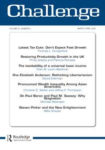Edit This is Don Lavoie’s letter giving his referee report on my Property & Contract book which was published by Basil Blackwell in 1992. Don Lavoie (1951-2001) was a neo-Austrian economics professor at George Mason University. He developed a hermeneutical approach to economics. Click here to download the letter.
Lord Eustace Percy’s “Unknown State” Lecture
Lord Eustace Percy was a Conservative public servant but was better known as a serious thinker, indeed, as the “Minister of Thinking.” There is a remarkable and much-quoted passage in his 1944 Riddell Lecture The Unknown State.
A Theory of Inalienability: Towards a Theory of Classical Liberal Jurisprudence
This is a draft paper that presents some of the arguments I have been making for years in a framework analogous to Type I and Type II error in statistics–which seems to clarify the arguments. Historically, the sophisticated arguments for slavery and autocratic government were consent-based in terms of implicit or explicit contracts. And the legalized oppression of married women was based on the coverture marriage contract. Hence the critiques developed in the abolitionist, democratic, and feminist movements were not simply arguments for consent as opposed to coercion, but arguments against certain voluntary contracts, e.g., in the form of inalienable rights arguments.
Talk: Neo-abolitionism and Marxism
These are the slides for a talk given in Munich in November 2017 at a conference on the Russian Revolution. The basic argument is that much of what John Stuart Mill said in the middle of the 19th century still sounds radical today. The reason is that Marx, Lenin, and the Russian Revolution set back the Left for a century and a half.
Talk: A Tale of Two Invalid Contracts: Coverture and Employment
These are the slides for a talk that focuses on the parallel inalienable rights arguments against the now-outlawed coverture marriage contract and the yet-to-be-outlawed employment contract.
Review-Essay on Elizabeth Anderson’s “Private Government” book
In her recent book Private Government [2017], Elizabeth Anderson makes a powerful but pragmatic case against the abuses experienced by employees in conventional corporations. The purpose of this review-essay is to contrast Anderson’s pragmatic critique of many abuses in the employment relation with a principled critique of the employment relationship itself.
Listen Libertarians! A Review of John Tomasi’s “Free Market Fairness”
John Tomasi’s 2012 book, Free Market Fairness, has been well received. On the dust jacket, Tyler Cowen proclaims it “one of the very best philosophical treatments of libertarian thought, ever” and Deirdre McCloskey calls it a “long and friendly conversation between Friedrich Hayek and John Rawls — a conversation which, astonishingly, reaches agreement.”
Reframing the Labor Question
Subtitle: On Marginal Productivity Theory and the Labor Theory of Property
This paper reframes the labor question according to the normal juridical principle of imputation whose application to property appropriation is the modern treatment of the old natural rights or labor theory of property.
Labor theory of property and predistribution
This is the online-first publication in Challenge: The Magazine of Economic Affairs of an article on the labor theory of property showing the superficiality of the inequality-debate framing in terms of distribution (i.e., how much is distributed by a firm to labor versus capital) in favor of a framing in terms of what is now called “predistribution”–in this case the question of who is to be the firm in the first place, Capital or Labor.
Review of Erik O. Wright’s Envisioning Real Utopias
I rarely review books and almost never books by Marxists. However, in order to comment on a presentation at a conference, I decided to write up my extensive comments in the form of a book review of Erik Olin Wright’s Envisioning Real Utopias.




